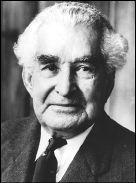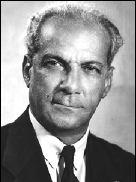By Ken Jones , Contributor 

Bustamante (left) and Manley (right)
DEEP AT the root of Jamaica's political culture is a munificent obsession known generally as hero worship and internationally as the cult of personality.
It is something to which the electorate has willingly subjected itself; and while some benefits might fortuitously have been derived, it is as always an arrangement that carries a price and is both seductive and potentially destructive.
In totalitarian societies strongmen and dictators impose the cult by threats of imprisonment, banishment or death. In this country where so many fail to distinguish between trivia and real business, there is a willingness to play the role of underling while delegating authority and abdicating responsibility.
JAMAICA'S LOVE AFFAIR
Jamaica's love affair with political cult of personality goes back to the emergence of Alexander Bustamante and since then, the electorate, with childlike simplicity, has been searching for someone to look up to; some Atlas to ease their burdens; some Moses to take them to the Promised Land.
After Bustamante it was Norman Manley, then Michael Manley; and now, having gone 10 years without a dominant and charismatic figure, they still seek to find solutions in personalities rather than the policies and programmes; and as they wait they are turning to local dons and so-called area leaders.
In the beginning, Bustamante, the dominant figure in the uprising of 1938, had no charted course and promised little more than higher wages and better working conditions. He was not the first trade unionist to organize the workers. He addressed his audiences from street corner platforms raised by other men. By traditional standards he was not the most brilliant of orators, but the masses loved his style and by sheer power of personality he had them pledging to follow him even unto death.
In 1943 Bustamante organized the Jamaica Labour Party as the political wing of his trade union, the BITU. With him as the leader, the party was a winner from the start.
NEITHER PLAN NOR PROGRAMME
It had neither plan nor programme and the following year when the first elections were held under adult suffrage the highlight of the unwritten manifesto was a little more bread, and a little more butter.
The opposing People's National Party offered ideology, raised national issues and proclaimed the virtues of self-government and dominion status. That message was lost in the shadow cast by Bustamante's shining personality.
Then, as now, the Jamaican people demonstrated a remarkable lack of interest in and understanding of the real issues affecting the country and its people. This first battle between national issues and the cult of personality was a one-sided affair.
LITTLE KNOWLEDGE
In addition to their tiny understanding of public matters, the voters had precious little knowledge of electoral procedures and significant numbers were experiencing difficulty in recognizing names written on the ballot papers. This had caused the authorities to use graphic symbols to help the inexperienced identify candidates of their choice.
Each person running for election was assigned a symbol based on the first letter of his surname, but those conducting the voting could have saved themselves the trouble because the adoring masses preferred to let Bustamante decide what was best for them. He chose his own slate of candidates and all his campaigners had to do was to let the name of Bustamante fall droolingly from their lips.
In response to the massive defeat of 1944, the PNP took a leaf out of the winners book and determined to provide a match for Bustamante. Tireless organizers intensified the group structure and pushed the political education that was necessary if Jamaicans were to understand the pathways to nationhood and prosperity.
Meantime nobody was losing sight of the Jamaican predilection for shedding political responsibilities and trustingly delegating authority to a leader of their liking.
One observer remarked: the PNP retreated from Fabian preoccupation with party programmes and intra-party democracy, concentrating instead on fighting political warfare Jamaican style.
The PNP, recognizing the impact of the cult of personality proceeded on a two-pronged strategy, including charisma assassination, tarnishing Bustamante's image while burnishing that of Norman Manley.
AN INTELLECTUAL LIGHTWEIGHT
They portrayed Busta as a wicked moneylender, an intellectual lightweight, unable to spell simple words such as bread, and wise only in the ways of the 'ginnal'.
On the other hand, Manley was painted as one of the world's brilliant lawyers, internationally acclaimed; Father of the Nation and The Man with the Plan.
With such a choice, it was suggested, a man would be out of his depth and out of his mind if he didn't know which personality to follow. The twin attack comprising political education and personality promotion worked effectively for the PNP.
Manley who had been unable to win a seat in the first election, won handsomely in '49 and the party actually polled a plurality of votes but got a minority of the seats.
The strategy continued unabated and when the PNP won in 1953 the lion's share of the credit was given to the Norman Manley persona. He had led the party to victory despite the expulsion of those activists who were more concerned with the spread of ideology than the cult of personality.
Manley wore his halo well until he began promoting West Indies Federation, an idea that was never warmly received by the Jamaican people. To make matters worse, he with the brilliant mind, had opted to leave the federal leadership to small island personalities who were little known in Jamaica.
Norman Manley lost the federal elections in Jamaica and later when the federation ran into trouble, he was manoeuvered into a referendum which he also lost to Bustamante. His personality was fading and Bustamante, who had never lost his personal charm, regained the ascendancy and again defeated Manley in the elections leading up to Independence. With the retirement of both Norman Manley and Bustamante, the Jamaican people began looking for another Moses and found him in the form of 'Joshua'.
Michael Manley came as an unreconstructed and unrepentant federationist, but the masses didn't mind. When he began his campaign Jamaica had been experiencing a period of unprecedented growth and development under the JLP, but that was no match for the promise that 'Better Must Come', combined with dazzling charisma, a silver tongue and a carefully developed cult of personality.
POLITICALLY EXCITING
The period of the '70s was the most politically exciting. Armed with the best of intentions, Government heads spun with grand ideas, hands turned to brave experiments and eyes were fixed on the mountain top.
It was also the most traumatic of times divisive, frightening and confusing for the people. Eventually, with the economy in ruins, social programmes abandoned and everything in short supply, voters turned away from the PNP. Michael's image had been somewhat tarnished but the bulk of the blame was attributed to foreign destabilizers and others who were concerned with ideology and political philosophy.
In the 1980s the leadership of the JLP did much to repair the badly damaged goods it had inherited. The economy was growing once again, issues were being systematically addressed, but that didn't matter.
The voters, more in tune with personalities than with policies and national goals, waltzed back into the arms of a reconstructed and repentant Joshua who was offering nothing much different from the administration he wanted to supplant. Michael Manley has been succeeded by Jamaica's shrewdest political organizer.
With such skills and in the absence of any rival with an overwhelming personality, the incumbent needs devise no cult of his own.
In spite of being directly blamed for years of suffering and uncertainty he remains in office because the alternative for which the electorate is searching is not a person with a manifesto but one with a halo and a warm hello; or perhaps a huge hug and a passionate kiss. This is the danger of the cult of personality.
* Ken Jones is a veteran journalist and general secretary of the Fraquharson Institute of Public Affairs.

